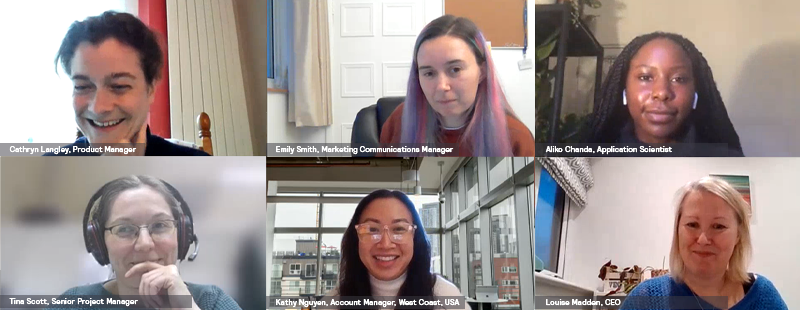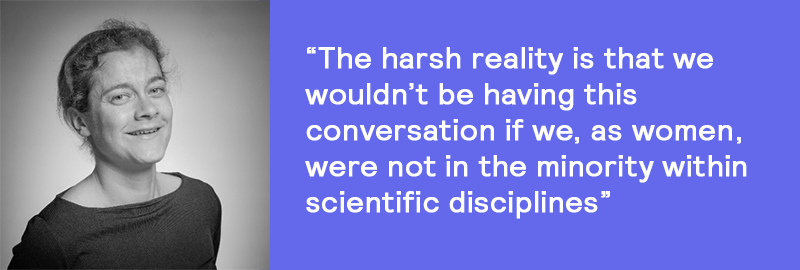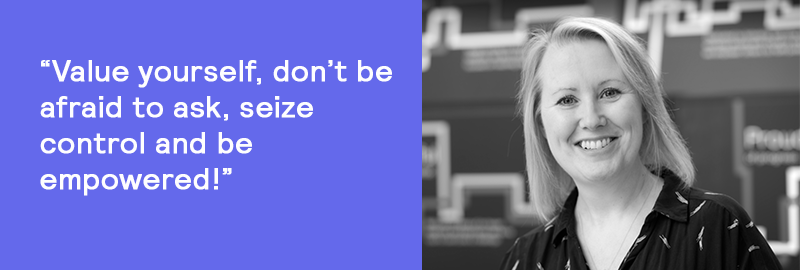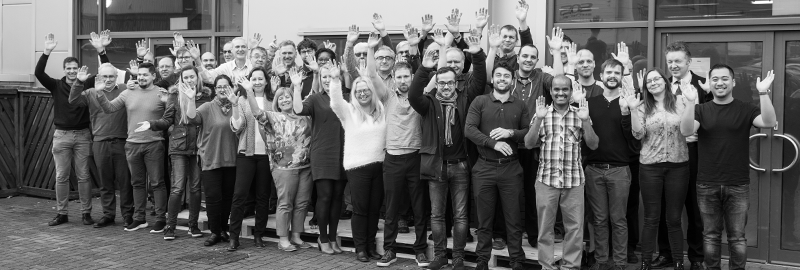To mark the UN’s International Women and Girls in Science Day, some of H.E.L’s women in science share their insights of working in science and their own career experiences.
Our contributors were:
- Aliko Chanda, Application Scientist
- Cathryn Langley, Product Manager (and author)
- Louise Madden, CEO
- Kathy Nguyen, Account Manager, West Coast, USA
- Tina Scott, Senior Project Manager
- Emily Smith, Marketing Communications Manager

What is a career in science anyway…?
All lab coats and test tubes, right…? One of the first things that really struck us was not only the breadth of the roles we do, but the variety of routes we’ve taken to get to them.
Whilst we all had an early connection to science, we each found different routes into the industry: some gaining experience in a variety of roles within science, some branching into finance, business operations and marketing, before returning to science in later years. Among the group, the roles range from CEO, through technical, lab-based, to the increasingly people-focused, commercial positions – offering opportunities for all personality types and skill sets.
Women in science
We all agreed that one of the best things about working at H.E.L was that we are not treated any differently because we are women. Generally, over our respective careers, we felt that we have not suffered too much for being female – and that the odd comment or two we’ve received arises more from the fact that we are an anomaly than anything more sinister.
The harsh reality is that we wouldn’t be having this conversation if we, as women, were not in the minority within scientific disciplines. Why is this, and how do we change it?
It surely doesn’t help with the gender-stereotyping of toys from an early age – is there any good reason why science-related gifts are often categorized under “boys”? My toddler niece rather likes the planets, thank you very much!
Perhaps a lot comes down to increasing the visibility of women in science roles, breaking down misconceptions – a societal evolution. But beyond that, increasing awareness of the roles available within the science industry – across the gender divide – was recognized as a key factor to address.
The advent of STEM ambassador organizations and events like the Big Bang Science Fair are surely changing this by shining a light and facilitating conversations on career options. One “advantage” of the global pandemic and the climate crisis in the news is that it highlights the critical and varied roles of scientists to the wider public – demonstrating that science can lead to fulfilling vocations and really important careers.

Women in Leadership
Getting women into science is one thing, but as Louise pointed out: in three companies that she has worked for, she has been the only woman on the board. Why are there not more women in leadership roles – not just in science, but across industry in general – and what would help change that?
This is a complex issue which we are not going to solve in a short blog, but we’d argue it is a consequence of deep societal and cultural issues that influence how we, as females, are viewed and subsequently how we all behave.
Innate differences?
Women as child-bearers, and the impact this has on women trying to balance progressing a career and raising a family, is a well-recognized factor. Despite its obvious impact, we chose to focus on areas outside of this – although Louise noted that it was not surprising that it was during her time working for a Swedish company, with its extensive provisions for sharing child-care, that she saw greater parity at leadership level.
There’s also the old adage that you can give the same job description to a man and a woman of equal ability and, whereas the woman will identify elements that convince her not to go for the role, the man will confidently believe he can do it.
Is this innate? Do we not value ourselves enough? Or is this also a reflection of wider society, which tends to subtly devalue the contribution of women, and so-called “female” qualities? (e.g., care-giving professions are notoriously poorly paid). And heaven forbid you’re a male “beaten by a girl” – are we made to feel inferior from an early age? Why do we tend to question our abilities more?
Louise revealed that taking on a leadership role was initially fraught with self-doubt – even at the very top level, imposter-syndrome still lurks. Is this a more prevalent trait for a woman at this level? Crucially, the advice Louise would give is to back yourself, and realize that you are always learning no matter what level you are at, and you aren’t expected to know everything from the start.
Society/cultural expectations
There’s often an underlying expectation that we should put others first, before ourselves – be that supporting our partner, children or family: facilitating and supporting others to achieve their ambitions. Society views men and women differently, based on cultural expectations of how we “should” behave. Women who aren’t afraid to promote their abilities, or are ambitious, or driven, are considered “pushy”, “bossy” or “strident”, whereas men with the same characteristics are termed “confident” or “authoritative”.
We were all able to point to examples of lazy stereotyping in everyday life, which, while frustrating, is only going to change as society evolves and more people “break the mold” – leading nicely into…
Role Models
We speculated that the relative lack of women in high level management positions inevitably subconsciously filters down to younger women and girls, such that for many of us, it doesn’t even cross our minds as a career ambition – thus highlighting the need to have women in visible leadership roles. As was eloquently put: although some object to quotas aimed at driving up female participation, it is key to changing the status quo – it is not about the board at that moment in time, but the impact that it has on women coming into the business, and the effect of that 10 years later. It’s invaluable that people see women, like Louise, in leadership positions as it starts to change the mentality: the more women are seen at the top, the more others will recognize it is a realistic option for them.

We are different, but we bring a complementary skill set which is just as valuable. Arguably, historically, society has expected a certain type of “leader” – but it is being recognized that a more balanced, nuanced approach is desirable. This has never been more evident in the past year, where the topic of different leadership styles has frequently been commented on in terms of response to the COVID-19 pandemic. It is worth noting that this doesn’t necessarily follow gender lines, but talks more generally of personalities and approach.
We have a different way of approaching and thinking about problems, drawing on experiences unique to us, which is invaluable in solving complex challenges. This is, of course, a strong argument for diversity at the top level in general. If the people making decisions come from much the same background, they’re inevitably going to make those calls based on, and maintaining, their world view.
But how do we encourage women like us to move through the ranks and up to higher levels? Networking events can help: not only in finding out about the industry, but also providing the opportunity to make contacts and/or seeking mentors and advice from those further along their career path. Ultimately, it is having the confidence to say: well, I’ve done this role now, I want to try the one above me – how do I get there?
And finally, what advice would we give for women and girls considering pursuing a career in science?

1. Really value what you do
Truly appreciating the value that we bring to the table is really empowering, as it frames all our subsequent interactions
2. We are different – and this is a positive!
We shouldn’t be ashamed of being different. We need to realize we’re just as good as men and often bring complementary skill sets
3. Seize control of your career
Remember to question where your career is going. Often, we just seem to fall into it rather than plan it in any great way. If you’re not happy, take action to change it. Don’t be afraid to explore other career and role opportunities – put your hand up and give it a go. If we don’t speak up for ourselves and be heard, no-one else is going to do it for us.
4. Don’t be afraid to raise the salary issue!
If you don’t ask, you won’t get. All you’re going to hear is yes or no – it’s not personal. It’s really empowering to feel that you’re getting commensurate pay for what you are doing.
5. Find a community, a support network, a mentor.
Seek advice and mentoring from people further along in their careers. And if you’re considering a career in science, shadow someone working in the area, immerse yourself in the world
6. It’s okay to fail!
Don’t be afraid to make a decision or of failure. Be patient with yourself. If it doesn’t work, it is okay – and you’ll have learnt something.
And we’ll leave the final words to Louise:
Believe in yourself, know that you are capable and have the intelligence to do what you’re doing – and more. So, go for it!







